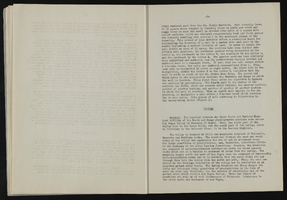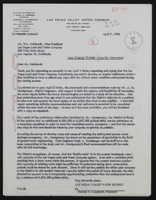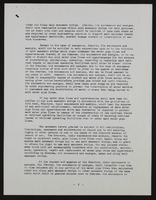Search the Special Collections and Archives Portal
Search Results
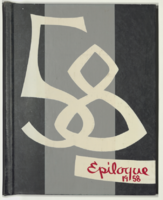
Epilogue: Nevada Southern University Yearbook, 1958
Date
Description
Yearbook main highlights: schools and departments; detailed lists with names and headshots of faculty, administration and students; variety of photos from activities, festivals, campus life, and buildings; campus organizations such as sororities, fraternities and councils; beauty contest winners; college sports and featured athletes; and printed advertisements of local businesses; Institution name: Nevada Southern University, Las Vegas, NV
Mixed Content

Meeting minutes for Consolidated Student Senate University of Nevada, Las Vegas, October 18, 1999
Date
Archival Collection
Description
Text
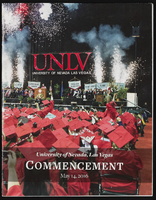
University of Nevada, Las Vegas (UNLV) Spring 2016 commencement program
Date
Archival Collection
Description
Commencement program from University of Nevada, Las Vegas Commencement Programs and Graduation Lists (UA-00115).
Text
UNLV Libraries Collection on the Las Vegas Paiute Tribe
Identifier
Abstract
The UNLV Libraries Collection on the Las Vegas Paiute Tribe (approximately 1974-1990) contain oral history transcripts of Paiute community members from approximately 1974 to 1977 and reproductions of Bureau of Indian Affairs correspondence, legal documents, annual reports, and census information regarding the area formerly known as the Las Vegas Indian Colony located in Las Vegas, Nevada. The documents contain information about the original transfer of property ownership from Helen J. Stewart to the United States, who acted on behalf of the Paiute people in 1911, the establishment of the original site location, and annual reports which include a narrative about the community, census information, and health reports of the population living in the area. The collection contains no original documents.
Archival Collection
Helen J. Stewart Papers
Identifier
Abstract
The Helen J. Stewart Papers (1869-1978) document the life of Las Vegas, Nevada pioneer, Helen J. Stewart. It includes correspondence between Stewart and her children as well as various family legal papers and certificates. The collection also contains Helen J. Stewart's 70th birthday scrapbook, a ledger, and a day book from 1904-1919, as well as several photograph albums and information related to the family burial plot.
Archival Collection

Luceanne "Lucy" Taufa oral history interview: transcript
Date
Archival Collection
Description
Oral history interview with Luceanne "Lucy" Taufa conducted by Jerwin Tiu, Cecilia Winchell, and Stefani Evans on December 16, 2022 for Reflections: the Las Vegas Asian American and Pacific Islander Oral History Project. In this interview, Taufa describes growing up on the Tongan island of Vava'u in a large family and later immigrating to the United States. She recalls her father first immigrating to Hawaii, and after obtaining a green card, her and her siblings following shortly after. While Kaufa's older siblings continued to pursue higher education and her younger siblings were too young to work, she took on a bulk of the responsibility to provide income and navigate life in Hawaii for her family. Eventually, Lucy moved to Dallas, Texas, met her husband, and moved to Las Vegas, Nevada for her husband's job. Later in the interview, she discusses joining the Culinary Union after experiencing racial discrimination at her workplace and her pride in her identity as a Tongan woman.
Text

